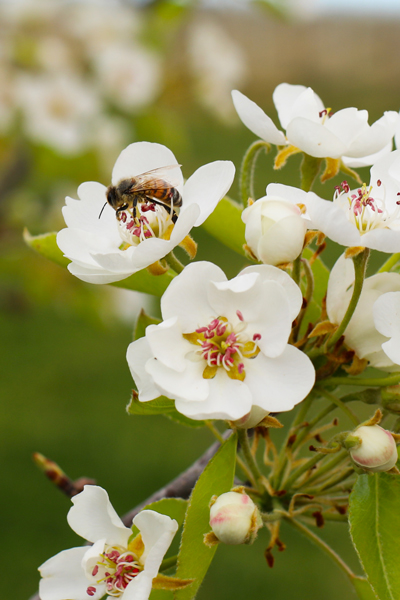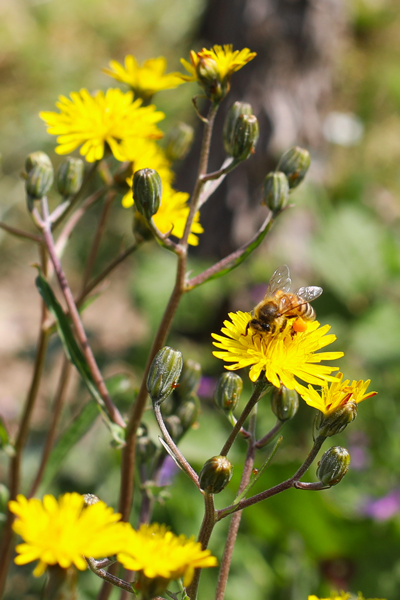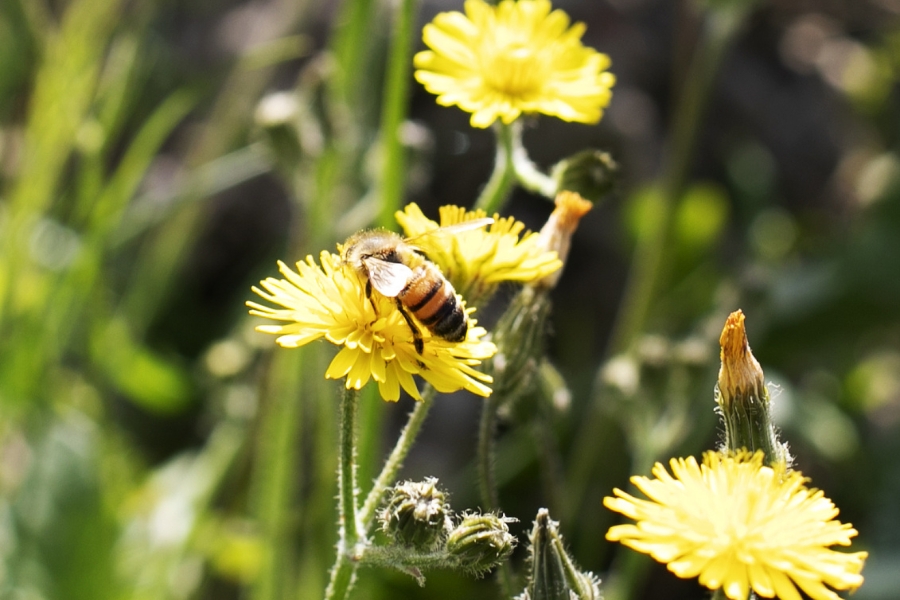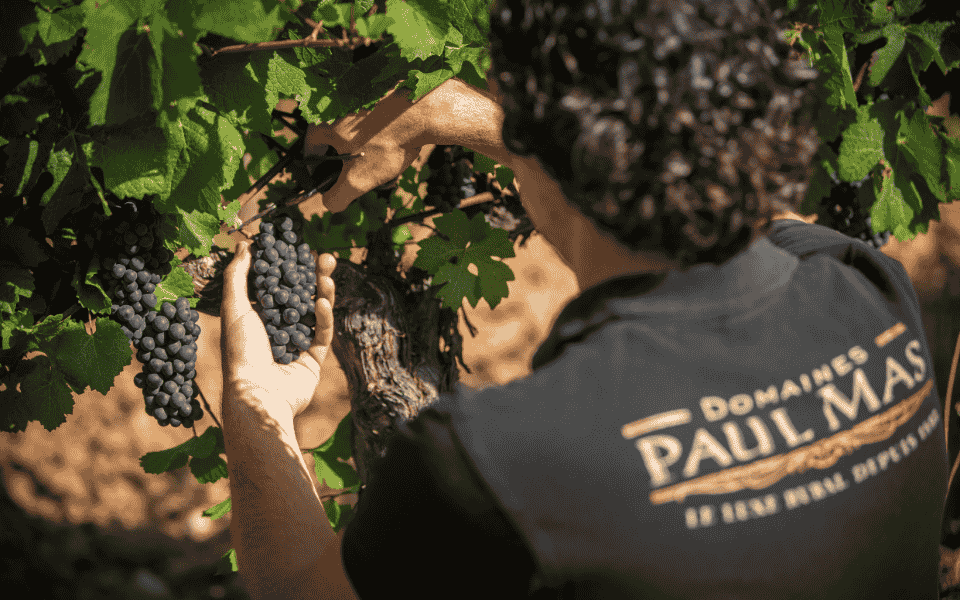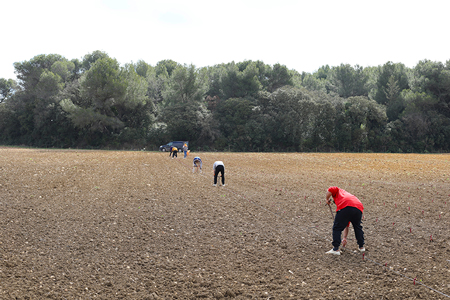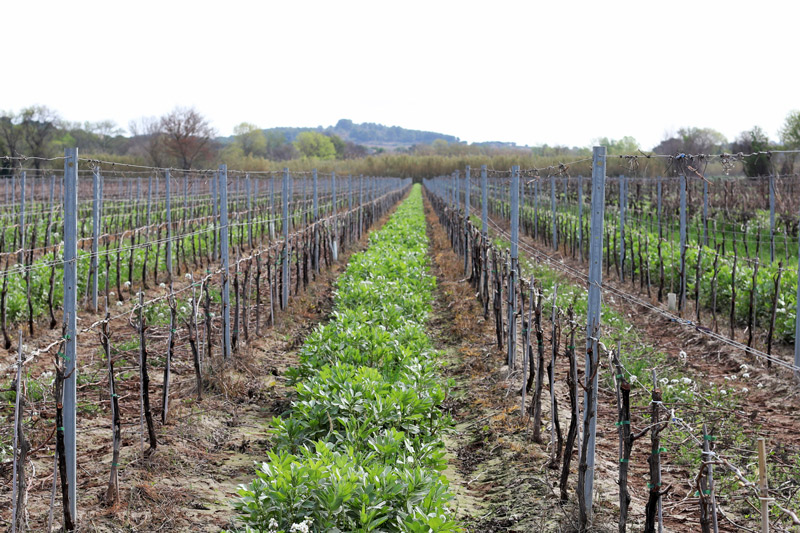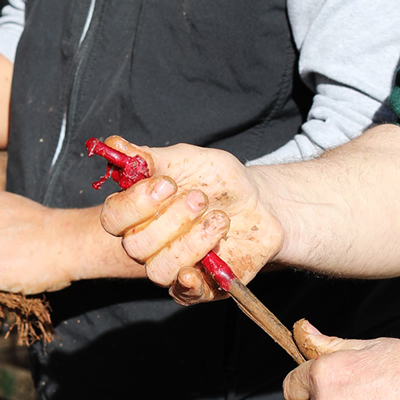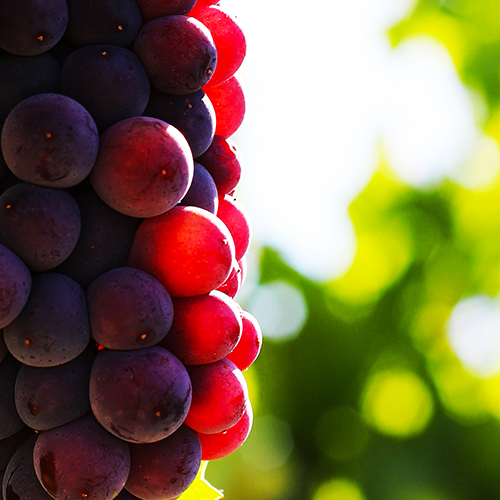

Bees:
Guardians of biodiversity in our vineyards.

In the vineyards of our estate, the relationship between viticulture and beekeeping is much more than a simple co-existence. Although the vines are naturally pollinated by the wind, we have learnt to recognise and value the essential role of bees in our ecosystem. For two years now, we’ve had the privilege of welcoming these precious guardians of biodiversity to the heart of our vineyards, in our educational beehives.
Why are bees important to our ecosystem?
The presence of bees in our vine rows is a blessing for biodiversity. Their pollination work encourages a multitude of flowers to bloom, enriching our vineyard plots with valuable plant diversity. This abundant flora creates a habitat conducive to a flourishing biological life in the soil, nourishing the earth and contributing to its natural balance.
This harmony lies in our commitment to environmentally friendly agriculture. Guided by the principles of biodynamics, we have eliminated the insecticides and fungicides that are most harmful to bees. By doing so, we offer these wonderful creatures a haven to thrive in.
For us, preserving the health of our ecosystem goes hand in hand with the quality of our wines. Every day, we strive to cultivate a living land, where the harmonious cohabitation of vines and bees is the key to a sustainable and prosperous vineyard.
What are the different types of bees found in hives?
- Newly hatched bees: At the beginning of their life cycle, these bees are key to ensuring the colony’s succession.
- Worker bees: These are the main workforce of the hive, collecting the nectar and pollen essential to the colony’s survival.
- Cleaner bees: Responsible for keeping the hive clean, they help to preserve a healthy environment for their fellow bees.
- Feeder bees: They feed the growing larvae, ensuring the colony’s survival.
- Builder bees: Talented architects, they work tirelessly to build and maintain the combs in the hive.
- Dancer bees: With their famous ‘dance’, they communicate the location of the best food sources to the other members of the colony.
- Soldier bees: Fiercely protecting the hive from intruders, they ensure the safety of the colony.
- Forager bees: They scour vast areas in search of nectar and pollen, helping to pollinate surrounding plants.
What kind of bees can we see in our vineyards?
Among the different types of bees, those that will be visible in and around our vines are mainly worker bees, forager bees and possibly cleaner bees.
- Worker bees: These tireless workers will be very present in and around the vines, collecting the nectar and pollen essential to the colony’s survival. Their incessant foraging activity leads them to cover vast areas in search of food resources, which will naturally bring them to your vineyards.
- Foraging bees: As their name suggests, these bees will also be active in your vineyards, actively seeking nectar and pollen to feed the colony. Their crucial role in pollinating flowers contributes to the reproduction of plants, including vines, making them welcome guests in your wine-growing ecosystem.
- Cleaner bees: Although their presence may be less obvious, cleaner bees help to keep the hive clean. They can be seen inside the hive, removing debris and corpses to maintain a healthy environment for their fellow bees.
The other types of bees, such as nurse bees, builder bees, dancer bees and soldier bees, will remain mainly inside the hive to carry out the specific functions required for the colony to function properly. These bees play key roles in the reproduction, construction, and security of the hive, but their activity takes place mainly inside its walls.
What are our educational hives?
Carefully designed, these hives provide an ideal environment for our bees, encouraging their activity in perfect harmony with their natural habitat. The special feature of our hives lies in their ingenious design: the chimney that makes them up forces the bees to enter and leave the hive at a height of 2.50 metres from the ground. This ensures that our little workers can move around freely and safely, allowing them to go about their business without hindrance.
Thanks to integrated windows, our visitors also have the chance to immerse themselves in the fascinating world of bee life. Observing the colony at work, they can appreciate the complexity of their social organisation and understand the crucial importance of their role in preserving biodiversity.
As well as making an essential contribution to the balance of our winegrowing ecosystem, these educational hives embody our commitment to environmental education and awareness. By offering our visitors the unique opportunity to observe bees at work, we aim to raise collective awareness of the importance of protecting and preserving these wonderful creatures that surround us.
Our partner: Miellerie des Sources
We would like to express our gratitude to our partner, Miellerie des Sources, whose commitment goes far beyond the installation of our hives. Their dedication to caring for our residents is exemplary, keeping us informed of their health and progress, and taking charge of packaging the honey they so generously offer us, all the while sharing with us from time-to-time beautiful images and educational videos that we would like to share with you. Thanks to their expertise and constant attention, our bees thrive in an optimal environment, guaranteeing the exceptional quality of the honey we have the pleasure of sharing with our customers.
